If your company is in financial distress or facing insolvency, it’s natural that you will have numerous queries and concerns. It’s essential you seek answers from experts quickly to give you the best possible chance of putting your business back on the road to recovery.
Here are some of the most common insolvency questions from company directors that we answer here at Insolvency Support.
Q. How can I tell if my company is insolvent?
A. It can be surprisingly hard to work out the state of your company’s books.
The first question to ask is called the cash flow test. Can you pay your debts as they fall due? If the answer is ‘no’, you are cash flow or commercially insolvent. It’s usually simple to answer this question.
The second question is the balance sheet test. Are your company’s assets greater than its liabilities? If the answer is ‘no’, you are balance sheet insolvent. This question is harder to answer, as you’ll need to value your assets, which can change.
Q. Sales are up, so can my company really be insolvent?
A. Yes. In fact, according to the Institute of Chartered Accountants in England and Wales (ICAEW), businesses might be most at risk during times of recovery from recession, when sales suddenly boom and companies struggle to keep up. While you want a healthy turnover, it’s your profits that really matter.
Q. What action should I take if my business is in distress?
A. If you can see there’s a problem but you haven’t yet reached insolvency, take action fast. Consult your accountant immediately, and seek advice from an insolvency practitioner. There may well still be plenty you can do, such as exploring refinancing to ease cash flow problems.
If you can’t see any viable options, or you feel the stress is too much, it’s simpler to close down your company if it’s solvent.
Q. Can I legally close down my company if I’m worried about insolvency?
A. The role of company director is a hugely responsible one, and many decide to close their businesses to ease the strain. There are a few methods, including Members’ Voluntary Liquidation and Voluntary Dissolution, so it’s best to get expert advice. Whichever one you choose, you’ll need to settle your debts and tie up loose ends to avoid any issues further down the line. You must keep up-to-date records, too.
Q. What action should I take if I think my company is insolvent?
A. This is certainly one of the most common insolvency questions. Once you know you’re insolvent, you need to take action right away. Don’t take any payment or lines of credit until you’ve got a plan in place. Appoint an insolvency practitioner who can examine your company finances, help you explore your options, and put you on the path to recovery.
Q. Can my business recover from insolvency?
A. This is often possible, but chances are highest if you act early with external support from expert insolvency practitioners. There are several options.
If you think your business is still viable, you can propose an informal agreement or negotiate a Company Voluntary Arrangement. These give you breathing space to pay back your debts.
Administration involves temporarily giving up control to licensed insolvency practitioners, who will explore ways to restructure your company. Pre-pack administration is a variation that could work if part of your business is still viable.
All options have their pros and cons, but Insolvency Support can advise you about this and all other common insolvency questions.
Q. As director, am I personally liable for my company’s debts?
A. If you’ve personally guaranteed any loans, you are liable to repay them. As director, you’ve also got certain legal responsibilities to your creditors. If you continue to operate your business after it has become insolvent, you could face charges under the Insolvency Act 1986. Wrongful trading is a civil offence, while fraudulent trading is a criminal offence. Both carry heavy penalties.
Q. How can I avoid charges of wrongful or fraudulent trading?
A. Company directors need to stay on top of company finances and take decisive action at the first signs of distress. If you become insolvent, you must take care not to prefer one creditor over another, to accept credit that you might not be able to repay, or take customer orders that you might not be able to fulfil.
Q. Can my creditors force me to close?
A. You should always try to reach agreement to repay your creditors, otherwise they could launch action to close your company, for example by issuing you with a winding-up petition. If the courts uphold that, your company will be place in compulsory liquidation and closed down. This is one of the many common insolvency questions that Insolvency Support can help you with.
Q. Who gets paid if my company goes into liquidation?
A. There are several categories of creditor, which must be paid in order. They are ranked as follows: Liquidator fees and expenses; secured creditors with a fixed charge; preferential creditors; secured creditors with a floating charge; unsecured creditors; connected unsecured creditors; shareholders.
Your appointed liquidators will handle this for you, but it’s important for you to note that shareholders have the lowest priority.
Q. What will happen to my employees?
A. This is a worrying time for your employees as well as you. If your company enters administration, it might well be restructured, potentially leading to job losses. If it enters liquidation, your employees will be automatically dismissed.
Either way, they will be entitled to redundancy pay, plus other entitlements such as wage arrears. In the ranking of creditors (see above), they count as preferential creditors. If your company can’t cover these costs, payment will come from the government’s National Insurance Fund (NIF).
Q. Where can I get expert advice?
A. If your company is at risk of insolvency, you need to consult a licensed insolvency practitioner as early as possible. Insolvency Support can examine your finances, explore your options with you and answer all your common insolvency questions and more. We have helped to transform many directors’ lives, and put companies on the path to recovery.
Talk to the team today to see what we can do for you.


